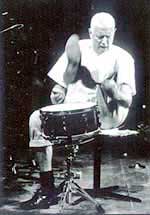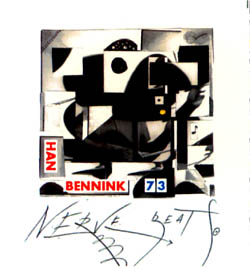

Courtesy
of Han Bennink

Atavistic
A
FIRESIDE CHAT WITH HAN BENNINK
Music has become boring. I browse my local Tower bin
and I can't come away with one recording (and I look for hours). And although
a good deal of that futility is due to the fact that I have an impressive
collection (it pales in comparison to fellow Weekly Roadshow bus riders),
most of the blame can be cast to the obvious fact and there is nothing
new being released. Without taking a look at the major labels' (what is
it four now?) schedule for next year, I can predict there will be less
than a handful of recordings I will be even remotely interested in. What
a sad state of affairs that I want to spend money on jazz (in all its
many forms), but there is nothing worth spending it on. It is no wonder
that jazz is less than one percent of all retail sales. How tragic. Thankfully,
there is hope. Han Bennink has two releases out that are well worth anyone's
duckets. Nerve Beats, just reissued by the dedicated folks at Atavistic
as part of their Unheard Music Series and Jazz Bunker, a trio release
with Eugene Chadbourne and Toshinori Kondo, on Leo. I should have known
that someone who has played with Eric Dolphy on his Last Date would be
saving me from jazz record buying oblivion. The following is the Weekly
Roadshow's chat with Bennink, unedited and in his own words.
FRED JUNG: Let's start from the beginning.
HAN BENNINK: I was already interested in Little Richard when I was young
and my father let me hear Benny Goodman and Louis Armstrong. I was born
during the war and after the war there was only American music to listen
to - Frank Sinatra.
FJ: With your father being a percussionist himself, what guidance, if
any did he give to you?
HAN BENNINK: My father told me about Gene Krupa, but I was interested
in bebop. My father didn't really teach me - I often went to the studio
with him while I was a child, started drumming myself in the intermission
when everyone had left. My father was a very skilled percussion player,
but he wanted me to learn to read music. I still cannot read music. But
he always provided me with drums. For Sinterklaas, he gave me Zildjan
cymbals.
FJ: Let's touch on your collaboration with Eric Dolphy. You played with
Dolphy on his Last Date recording.
HAN BENNINK: He had integrity. He was always busy with music, practicing
- almost like a classical musician. He always wanted us to play his music,
which I thought odd because we often played the standards. He was also
interested in art in the broadest sense.
FJ: How was the European scene different from its American counterpart
in the Sixties?
HAN BENNINK: I don't know if it was all that different. I was influenced
by Albert Ayler, for instance, and Cecil Taylor. That was avant garde
too - perhaps we dealt with it differently here, but I don't think so.
FJ: Let's talk about your work with the Instant Composers Pool. When did
you form the collective?
HAN BENNINK: In 1967 with Misha Mengelberg, Willem Breuker and me. We
wanted to organize concerts and produce records without the middleman,
directly from artist to consumer. Misha thought up the name.
FJ: And your collaborations with Misha Mengelberg?
HAN BENNINK: No comments!
FJ: And Willem Breuker?
HAN BENNINK: Always fun to play with Willem.
FJ: And Peter Brotzmann?
HAN BENNINK: Brötzmann is Brötzmann - there's not much more I can say!
FJ: You played with Eric Dolphy and spoke eloquently about him in the
film Last Date, your impressions of Dolphy.
HAN BENNINK: When I played with Dolphy, I was still playing time rhythm
- a regular beat, sometimes 4/4 or 5/4 or 3/4. In that respect, it wasn't
much different from playing with Dexter or Johnny Griffin. Dolphy was
a brilliant man who worked very hard and ate way too much honey.
FJ: You attended art school. What forum do you prefer to express your
creativity? And how do you incorporate that into your music?
HAN BENNINK: I don't paint. I draw here and there a little bit, but less
and less because all my energy goes into traveling and performing - which
I love! Seems I can only live in my music. I do have occasional exhibitions
of some of my artwork. I also make CD covers for musical colleagues.
FJ: How many different instruments do you play?
HAN BENNINK: I try to play my best on one snare drum.
FJ: Is it difficult maintaining your proficiency on those instruments?
HAN BENNINK: It's hard to expand your horizon. You have to force yourself
- which I do.
FJ: You have done a number of solo projects. Is it a challenge to hold
down the attention of the listener on your own?
HAN BENNINK: When I play solo, it is very lonely because in fact you are
performing for yourself. You are the sole responsible person for the music.
FJ: You played the kitchen chair when you were in your youth. What is
the key to playing a chair? Do you still bring out a chair once in a while
and play it?
HAN BENNINK: Sure, but that has nothing to do with my childhood. I used
a chair then because I didn't have a snare drum yet. It was a Thonet chair
and I used an empty jenever bottle as a cymbal and an old skull. Now,
I take chairs out to play on because a wooden chair simply sounds nice
on a wooden floor, or I let a chair play on the cymbals - a chair doesn't
often get that opportunity. I almost never sit on a real drum stool because
once I forgot to put the top on and really hurt my backside.
FJ: Atavistic and John Corbett are reissuing your classic Nerve Beats
recording. It was recorded in 1973, when you were still in a trio with
Brotzmann and Van Hove. You use an early version of a drum machine on
the solo recording.
HAN BENNINK: I hope that lots of people like the noise from 1973, but
I don't plan to listen to it myself. It's in the past and I'm really only
interested in what I'm going to play next. I do like the cover that I
spent a weekend working on.
FJ: There is a growing scene in Chicago. What is it that you enjoy about
playing in Chicago and with Chicago musicians?
HAN BENNINK: I think Chicago is a fantastic town, nicer than NYC (different).
I went with Bruno to the White Sox and was more interested in the nighthawks
that flew above the stadium than in the game. I played in Chicago ages
ago with Von Freeman and Johnny Griffin and now with Ken (Ken Vandermark).
Although I'm not charmed by the idea of playing with other / more drummers,
it's unbelievable the way Hamid (Hamid Drake) and I play together. I've
played several times in Chicago and I hope to go back there often.
FJ: As a member of the ICP Orchestra, is drumming for a large ensemble
different in approach than a trio or duo setting?
HAN BENNINK: Indeed, drumming in the ICP Orchestra is not an easy task.
I certainly can't play the pieces louder than Mary, Tristan or Ernst.
In a duo situation I have more or varied possibilities. I am a fan of
the duo, and have played with Misha, Derek, Myra Melford, Fred Frith,
Dave Douglas, Eugene Chadbourne, Cecil Taylor, Peter Brötzmann, Willem
Breuker and many others in this setting.
Fred Jung is Jazz Weekly's Editor-In-Chief and not a member
of the ensemble cast of West Wing. Comments? Email
Fred.